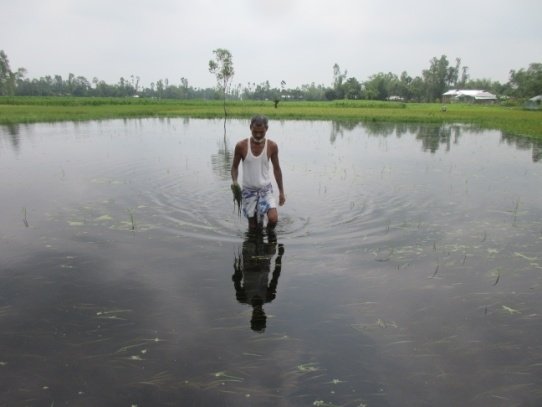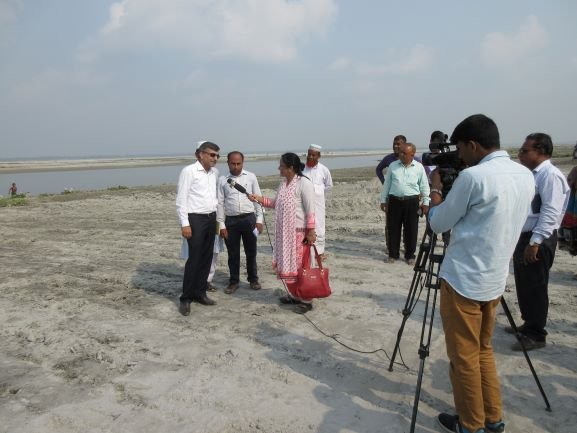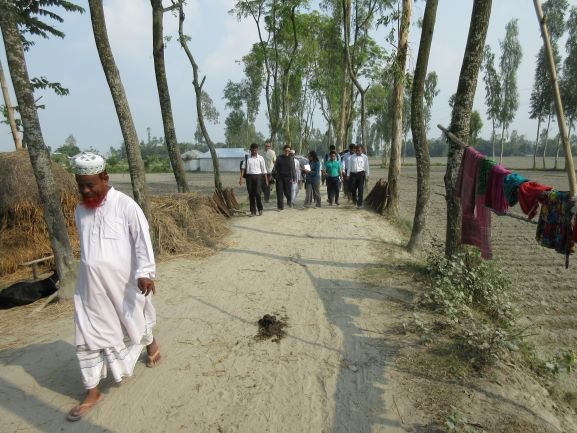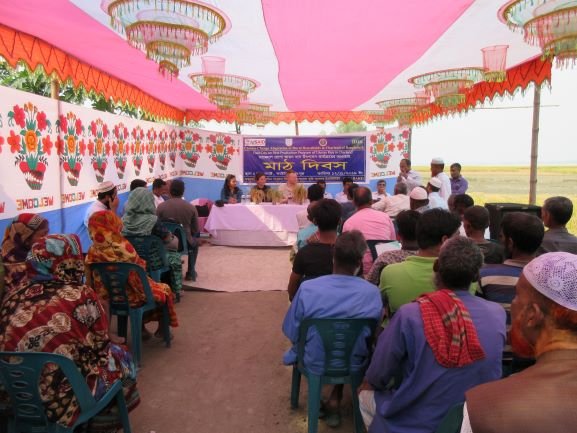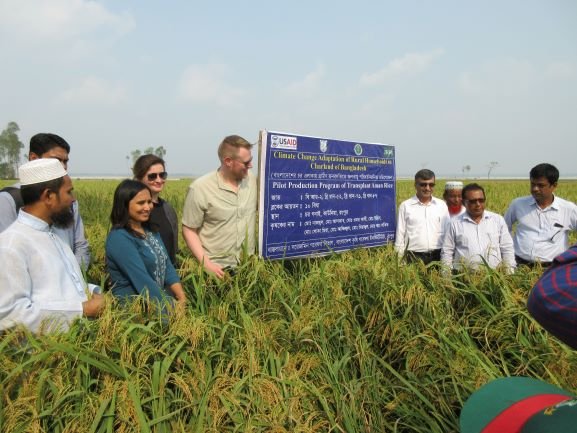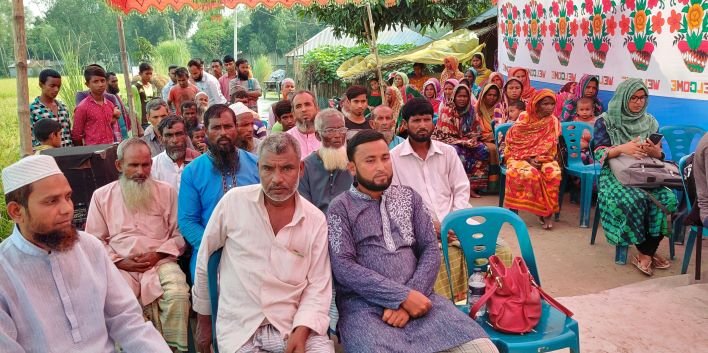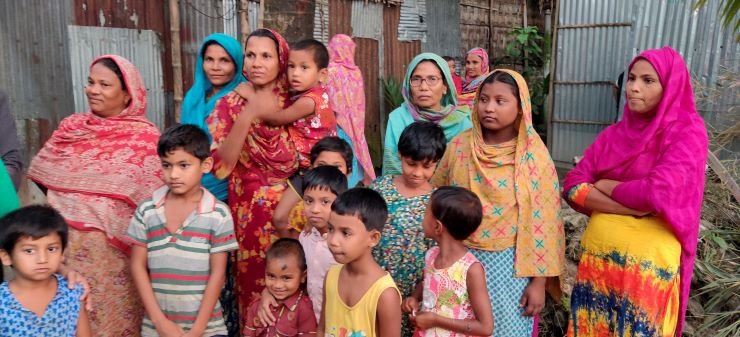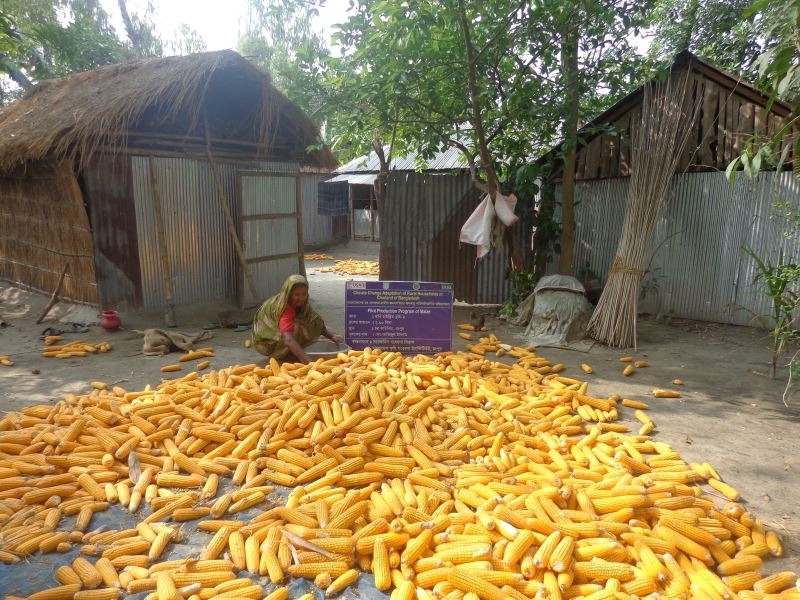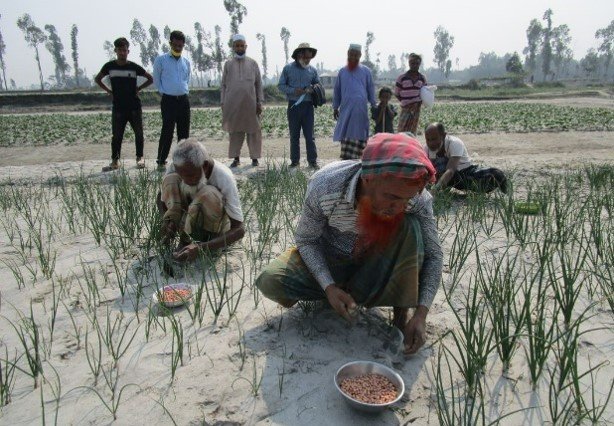|
Cycle 6 (2017 Deadline)
Climate change adaptation of rural households in charlands of Bangladesh
PI: Humnath Bhandari, h.bhandari@irri.org, International Rice Research Institute (IRRI)
U.S. Partner: Charles (Chuck) W. Rice, Kansas State University
Project dates: March 2018 - April 2022
Project Overview
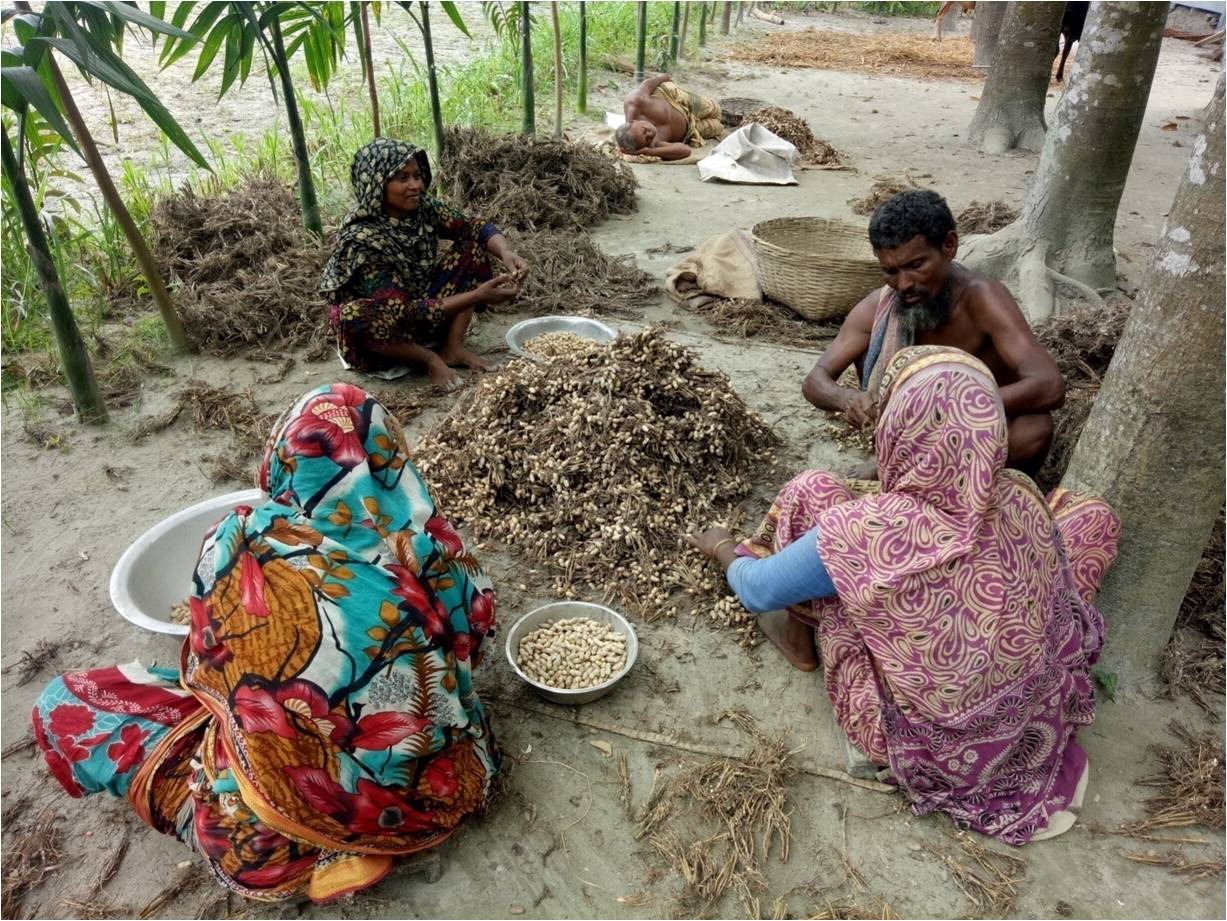 | | A smallholder farm family preparing groundnuts to sell in a market | | Aus rice first transplanting damaged by flood and second transplanting, Char Ganai, Rangpur, April-June 2020 |
The charlands in Bangladesh are riverine land masses formed over time through the deposition of sand, silt, and clay carried by the country’s four big rivers (Padma, Meghna, Jamuna, and Brahmaputra) and their more than 500 tributaries. More than 8 million people live in the charlands, but there is a high rate of poverty and food insecurity. Agriculture in the charlands of Bangladesh is characterized by rainfed cultivation, low nutrient levels in the soil, traditional crop varieties with conventional management practices, poor access to agricultural technologies and services, and low cropping system diversification. The charlands are highly prone to climatic stresses, including flood, drought, salinity, river and coastal erosion, and tropical cyclones, and local farmers suffer losses every year. The changing climate will amplify these problems in the future and make charland livelihoods precarious. The adoption and adaptation of climate-smart agriculture options could significantly reduce the negative effects of and build resilience to changing environmental conditions, but not every option is appropriate for every location.
This PEER project sought to understand charland characteristics and the livelihoods of local residents, examine households’ vulnerability and adaptation to changing conditions, and promote climate-smart agricultural technologies in charlands. The PI Dr. Bhandari and his colleagues focused on two study sites representing ecosystems prone to floods, drought, and salinity: Ganai Char, located in Kaunia Upazila in Rangpur District representing the charlands of the northern region, and Shaula Char, in Bauphal Upazila in Patuakhali District representing the charlands of the coastal region.
Final Summary of Project Activities
The PEER project team began with ten focus group discussions to collect information such as biophysical and socioeconomic profiles, climate and environmental factors, and livelihoods in the two study areas. They followed this up with a survey of 306 households in the Rangpur and Patuakhali districts and used the survey data for their economic analysis of the major cropping systems in the charlands. Survey results found households facing food insecurity during two periods of the year. Large gender differences in farm and non-farming decision making were also noted, and the survey confirmed farmers' perceptions of increasing temperatures and changing rainfall patterns. Farmers reported high vulnerability of agriculture to climatic risks, with up to 100% crop losses in some years for pulses and groundnuts. The survey found a range of adaptations, including changing planting and harvest times, changing input use, switching to alternate crops, using short duration varieties, increasing homestead farming, and keeping land fallow.
The researchers also conducted several field experiments in different cropping seasons in
the two study sites. They tested, evaluated, and scaled up 34 new or improved crops, varieties, and/or cropping systems in an 87-hectare area involving 512 farm households. They also organized farmers’ field days and demonstrations around these strategies to promote awareness.
The results of researchers’ economic analysis of different cropping systems show that Aman-Onion-Groundnut and Aman-Early Potato-Onion are the most economically viable cropping systems for the northern charlands, while Aman-Mungbean-Fallow and Aman-Groundnut-Fallow are the most economically viable for the southern charlands. Based on their field experiments, the researchers recommended improved rice varieties and suitable non-rice crops like sweet and bitter gourd, among others, as well as adding solar irrigation, temporary ponds, and dibbling cultivation methods to help farmers’ resilience to climate change.
As a result, more than 500 farmers in six villages are now using improved varieties of rice, groundnut, potato, mustard, mungbean, and others. The use of improved varieties and management practices increased yield and profitability of crops up to 150%. In the northern charlands (Rangpur District), the cultivation of improved groundnut varieties gave a 60% higher average yield and increased employment and income for farmers, especially for women in postharvest activities. Likewise, the cultivation of flood-tolerant rice varieties significantly reduced rice production losses from flooding. The PEER researchers also tested an improved rice-based cropping system (Aman Rce-Potato-Groundnut), which led to a 55% higher crop equivalent yield and 70% higher gross margin as compared to farmers' previous practices.
In the southern charlands (Patuakhali District), the cultivation of suitable cash crops such as mungbean, sunflower, watermelon, potato, and others produced up to a 150% higher gross margin per hectare as compared to farmers’ previous practices. The introduction of improved rice varieties allowed farmers to cultivate rice in the fallow areas and reduced production losses during flooding seasons.
Due to the demonstrated shorter cultivation duration, higher yield, and better adaptation to local agro-climatic conditions, the Department of Agricultural Extension and NGOs are scaling up these new crops and varieties in the charlands. The PEER project team trained more than 160 farmers (120 men and 40 women) and 20 agricultural extension workers on the new improved agricultural technologies and practices. As part of this project, six Master’s students were also supported in conducting their thesis research, and three members of the project participated in the International Rice Congress 2018 held in Singapore. The team organized a results sharing workshop attended by many researchers, extension workers, policymakers, planners, and others.
The PI and team also won four additional grants for related work from the CGIAR COVID-19 Hub, Asian Development Bank and J-PAL/MIT, for a total of $350,000. Their first two publications appeared in 2023, with others reported to be in process at the time of their final report.
Publications
Md. Naimur Rahman, Syed Anowerul Azim, Farhana Akter Jannat, Md. Rakib Hasan Rony, Babor Ahmad, and Md. Abdur Rouf Sarkar. 2023. Quantification of rainfall, temperature, and reference evapotranspiration trend and their interrelationship in sub-climatic zones of Bangladesh. Heliyon 9, e19559. https://doi.org/10.1016/j.heliyon.2023.e19559
Md. Abdullah Al Mamun, Sheikh Arafat Islam Nihad, Md. Abdur Rouf Sarkar, Mou Rani Sarker, Jitka Skalicka, and Milan Skalicky. 2023. Spatio-temporal variability of climatic variables and its impacts on rice yield in Bangladesh. Frontiers in Sustainable Food Systems 7, 1290055. https://doi.org/10.3389/fsufs.2023.1290055
Back to PEER Cycle 6 Grant Recipients
|
|
|
|





